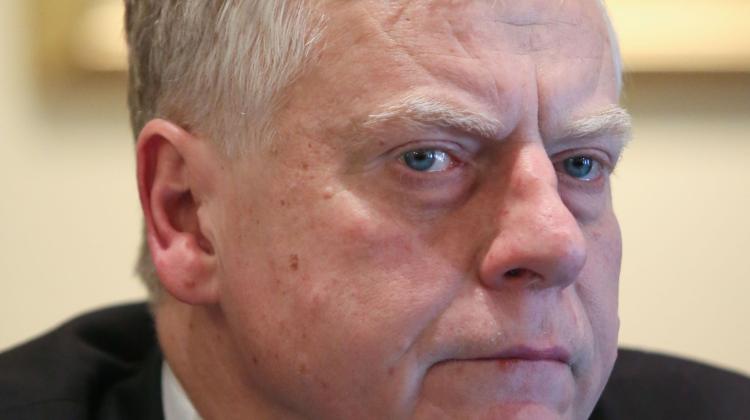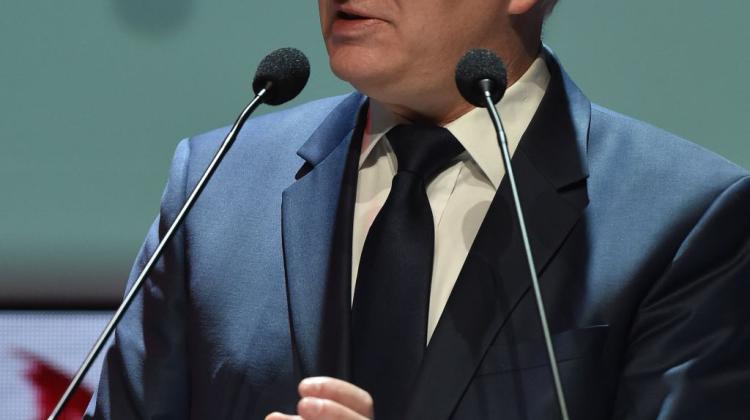Deputy Minister of Science: NAWA will facilitate the returns of Polish scientists to Poland
 Secretary of State at the Ministry of Science and Higher Education, Prof. Aleksander Bobko. Photo: PAP/ Leszek Szymański 31.01.2017
Secretary of State at the Ministry of Science and Higher Education, Prof. Aleksander Bobko. Photo: PAP/ Leszek Szymański 31.01.2017
The National Agency for Academic Exchange (Narodowa Agencja Wymiany Akademickiej, NAWA) will help young Polish scientists return to Poland, among other things by offering the guarantee of employment - told PAP Deputy Minister of Science Aleksander Bobko. NAWA is one of the flagship projects of the ministry.
The law to establish the Agency, prepared by the Ministry of Science and Higher Education, was adopted by the Sejm last Friday. According to the provisions of the law, NAWA is expected to launch operations on 1 October 2017.
Deputy Minister of Science and Higher Education added in an interview with PAP that programs for visiting professors would be an important part of NAWA\'s activities. The Ministry of Science wants to use those programs to attract more world\'s leading scientists to Polish scientific institutions. Minister Bobko expressed his hope that the Agency\'s programs would also help in establishing cooperation between Polish and foreign institutions.
PAP: For what purpose is NAWA being created?
Aleksander Bobko, Deputy Minister of Science and Higher Education: NAWA, the National Agency for Academic Exchange, is a tool designed to serve the academic community - from students to professors - in order to increase the level of international cooperation, between both individuals and institutions.
In addition, NAWA will in a sense compete the system formed by other agencies, the National Science Centre and the National Centre for Research and Development. Both agencies already have programs centred on international cooperation - we are in contact with them and we work to ensure that these programs do not overlap and are correlated.
PAP: Who will NAWA programs be addressed to?
A.B.: Firstly, they will be addressed to students. Much of this segment will continue the programs that exist today. We do not create things from scratch here, because NAWA takes over the activity of the Bureau of Recognition of Education and International Exchange, as well as several programs run by the Ministry of Science and Higher Education, such as Mobility Plus. There will be new student programs - more quality-oriented and aimed at, for example, encouraging outstanding or particularly gifted students, especially from the East, to come to Poland.
Our biggest hope for NAWA are the programs for doctoral students and for young scientists. An important part of these programs should be the "return component". Under this program, A young researcher who, for example, goes abroad for two years, should have a guaranteed job after returning to Poland. Programs for visiting professors will also be an important part of NAWA\'s activities. We would like to attract more prominent foreign scientists to Polish scientific institutions. Finally, we hope that the Agency\'s programs will also help in establishing cooperation between Polish and foreign institutions.
PAP: Are there any concrete plans for attracting foreign scientists to Poland?
AB: It is difficult to talk about details at this point- these programs will be announced at the earliest at the turn of the year or in the beginning of 2018. However, it is a known fact that the money that the inviting party is willing to pay are an important motivation for coming to another country. We hope that these programs will be sufficiently financially attractive to bring a group of prominent, prominent scientists from the West to Poland.
We are convinced that Poland can be an interesting country for scientists, due to both attractive equipment, which is the result of recent EU programs, and very good research teams. It is also important that today Poland is a safe country, where the quality of everyday life is surprisingly even higher than in richer countries - this can also be viewed as an advantage.
PAP: But will the "bad PR" of Poland not be an obstacle? For example media reports on attacks on foreign students?
A.B.: There is a kind of presumption that many groups in Poland do not like foreigners or people who look differently. I personally disagree with this opinion. Of course, we have treat such incidents in recent years most seriously. We remain in direct contact with the Ministry of the Interior and Administration and monitor all such cases.
Fortunately, monitoring these events does give us cause for alarm - there really are not many of these incidents. We also talk with universities and advise them to create clearly marked places where a person who has been injured or feels threatened can get help.
PAP: Deputy Prime Minister, Minister of Science and Higher Education Jarosław Gowin recently said that NAWA would be one of the beneficiaries of the additional billion zlotys for science. What is the proposed budget of the Agency?
A.B: Information about a billion for science is very recent. NAWA might also benefit from this - but the Agency was planned without this information. The budget of NAWA will consist mainly of the "dowry" brought by the Bureau of Recognition of Education and International Exchange - its budget amounted to nearly PLN 40 million. The next 20 million will come from the programs previously implemented by the Ministry of Science and Higher Education. We also plan to use the funds that were provided by our predecessors for the so-called studies for outstanding students. In our opinion, that program was not well designed because it carried the threat of brain drain, on top of that at the expense of the Polish state - these funds will go to NAWA instead. By 2023, we are also planning a significant injection of funds from the Knowledge Education Development programme, even up to about 50 million.
In total, the budget of NAWA will amount to about PLN 140 million. It is worth pointing out, however, that eventually NAWA could also become the operator of EU funds, just like the National Centre for Research and Development.
PAP: During the work of the parliamentary committee, the composition of one of the managing bodies of NAWA, the Program Council, aroused some controversy. How does the Ministry of Science and Higher Education plan the management of the Agency?
A.B.: The idea is that NAWA will be managed by a director with a subordinate office of 40 to 60 people. He will be responsible for the operation of the Agency and he will have a great influence on the creation of programs, their implementation, settlement etc. The second managing body will be the Program Council. It raised some doubts on the part of the deputies who feared it would be a political body - some members of the Council are appointed by the ministries, and some by academics, and the representation of the ministries is a bit higher.
However, we will make efforts to ensure that the people assigned to work in the council have the academic experience and competence, that they are doctors and professors. That is who we will nominate as our representatives. That will ensure that the Agency actually has the academic component that will think strategically and evaluate programs.
We also want to use the experience of existing agencies - they have a lot to say about how to run competitions, how to manage programs. People working on NAWA already use these skills - there have been several meetings where this exchange of experiences took place.
Interview by Katarzyna Florencka
PAP - Science and Scholarship in Poland
kflo/ agt/ kap/
tr. RL
Przed dodaniem komentarza prosimy o zapoznanie z Regulaminem forum serwisu Nauka w Polsce.

















